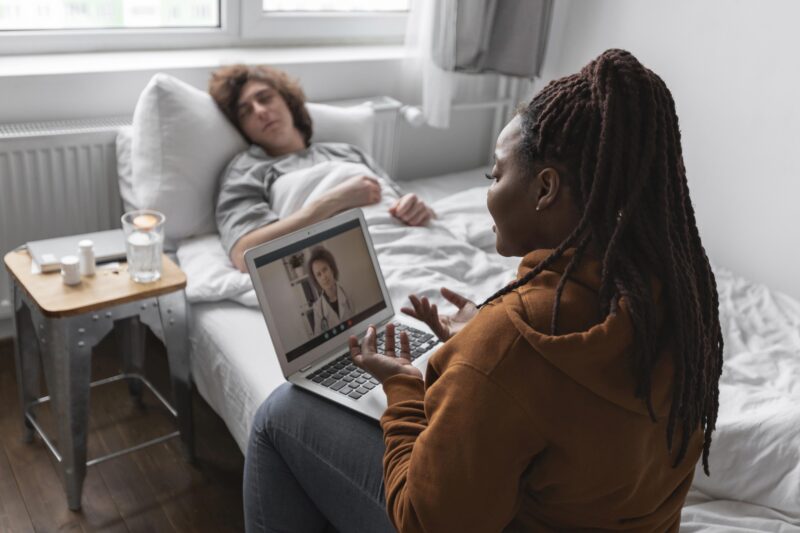Online therapy for mental health, virtual counselling, teletherapy for anxiety and depression, benefits of online therapy, how online therapy works
Picture yourself in your favorite chair, with your laptop open or phone in hand, starting a therapy session from the comfort of your home. No travel time, no waiting rooms just you, your thoughts, and a professional who is ready to listen. That’s what online therapy for mental health offers: convenience, flexibility, and growing effectiveness. In this article, we will thoroughly explore what online therapy entails, why it is becoming more popular, how it stacks up against traditional in-person counseling, and how you can determine if it is the right choice for you or someone you care about.
What is Online Therapy & Why Mental Health Matters
Online therapy (also called teletherapy or virtual counselling) refers to mental health support delivered via internet-enabled platforms, video, audio, messaging or a blend. According to experts, this format allows licensed therapists to connect with clients wherever they are, removing some of the logistical barriers of traditional therapy. (Verywell Mind)
Meanwhile, the demand for mental health care has soared globally. Whether it’s anxiety, depression, stress or trauma, people are seeking support in new ways and online therapy offers one strong answer.
Key Benefits of Online Therapy for Mental Health
Let’s look at some of the major benefits of online therapy, and why it’s becoming such a valuable part of modern mental-health care:
- Accessibility: No matter where you live even in a remote or rural area if you have a stable internet connection, you can access therapy. Research shows one of the biggest advantages of virtual counselling is reduced travel/time barriers. (PMC)
- Convenience & flexibility: You can schedule sessions around your life and log in from home, office, or even while travelling. That level of flexibility is a big win for busy lives. (Calmerry |)
- Comfort & privacy: For many, being in their own space makes it easier to open up. The stigma of walking into a therapist’s office is reduced. (Verywell Mind)
- Effectiveness: Studies increasingly show that online therapy is just as effective as in-person therapy for many conditions (e.g., anxiety, depression). (PMC)
- Cost-effectiveness: Online therapy often costs less (fewer overheads for therapist, less travel/time off work). It also makes ongoing care more sustainable. (Calmerry |)
Here’s a table summarising benefits vs limitations:
| Benefit | What it means for you |
|---|---|
| Accessibility | Therapy from anywhere → fewer barriers |
| Flexibility | Sessions that fit your schedule |
| Comfort | Home environment may enhance openness |
| Effectiveness | Comparable outcomes to face-to-face in many studies |
| Cost-effectiveness | Potential savings in time, expense, travel |
| Expanded therapist pool | Access to specialists beyond your local region |
What Are the Drawbacks? When Online Therapy Might Not Fit
While online therapy offers many advantages, it’s not perfect for every situation. It’s important to go in with eyes open.
- Technology issues: Poor internet connection, device problems, or lack of privacy can hamper the experience. (PMC)
- Reduced non-verbal cues: In person, therapists pick up body language, subtle cues and environmental context. Online, those cues may be diminished or lost. (PMC)
- Licensing and location rules: Some therapists can only treat clients in certain jurisdictions; online sessions across states/countries may face legal/licensing limitations. (Verywell Mind)
- Not always suitable for severe conditions: For crisis situations, active suicidal ideation, psychosis, acute trauma face-to-face or intensive in-person care may be safer. (National Center for Health Research)
Online Therapy vs In-Person Therapy: A Comparison
Let’s compare key dimensions of virtual counselling and traditional face‐to‐face therapy, focusing on mental health care, so you can understand how they differ and where one might be preferable.
| Feature | Online Therapy | In-Person Therapy |
|---|---|---|
| Accessibility | Very high (no travel required) | Lower in rural/underserved areas |
| Flexibility of scheduling | High (many options) | Might require travel, set hours |
| Therapist pool size | Larger (across regions) | Limited to local area |
| Non-verbal/physical cues | Reduced | Full access to body language, environment |
| Cost & overhead | Often lower | Possibly higher (office rental, travel) |
| Suitability for crises | Possible but requires precautions | Often more controlled, in-person setting |
| Effectiveness for mild-moderate | Several studies show comparable outcomes | Established track record |
Insight: For many people dealing with anxiety, depression, stress, or life transitions, online therapy offers a viable and often more accessible option. For complex mental health issues, in-person may still be preferred or required.
Who Should Consider Online Therapy for Mental Health?
If you’re reading this and wondering whether virtual counselling might work for you, here are some pointers:
Online therapy might be a good fit if you:
- Have limited time or mobility (e.g., remote location, disability, heavy schedule)
- Prefer the comfort of your home and want to avoid travel
- Live in an area with few mental health providers
- Want continuous or flexible access (messaging, video, etc.)
- Are dealing with mild to moderate anxiety, depression, stress or life change
You might want in‐person (or hybrid) care if you:
- Are experiencing a mental health crisis, suicidal thoughts or instability
- Need intensive therapy or medical/psychiatric supervision
- Feel more comfortable being physically present in a therapist’s office
- Want a therapist specialised in particular modalities requiring in-person work (e.g., certain trauma therapies)
How to Find & Choose the Right Online Therapy Service
Here’s a step-by-step list to help you choose a good online therapy provider:
- Check credentials: Ensure the therapist is licensed/certified in your region.
- Check modality & specialisation: Do they specialise in your concern (e.g., anxiety, depression, CBT, couples therapy)?
- Check platform features: Video, voice, messaging? What hours? Are sessions flexible?
- Check privacy/security: Is the platform HIPAA-compliant (or equivalent in your country)?
- Check cost & insurance: Does the provider accept your insurance or offer sliding scale?
- Test comfort: Many services offer a free consult use it to see if you feel comfortable.
- Understand the setup: What happens in emergencies? What if tech fails?
Practical Tips to Get the Most from Your Online Therapy Sessions
Here are practical ways you can maximise the value of your remote therapy sessions and make sure they’re effective:
- Create a quiet, private space for the session (ear-buds, minimal distractions).
- Test your technology ahead of time (video/audio).
- Be honest with your therapist about what works/doesn’t work for you.
- Engage actively: write down what you want to talk about beforehand.
- Keep consistent: schedule sessions at regular times where possible.
- After-session practice: apply what you discuss in real life; therapy works outside the hour too.
- Communicate openly: if online format feels uncomfortable, talk about switching or mixing with in-person.
The Future of Online Therapy & Mental Health Trends
As digital health evolves, online therapy will increasingly integrate with other technologies and approaches:
- Hybrid models: A mix of online + in-person sessions tailored to the client.
- Expanded use of apps & digital tools to support therapy between sessions (mood tracking, journaling).
- Greater global access: More countries adopting tele-mental-health policies, allowing cross-region treatment.
- Focus on user experience: Research shows that engagement, therapeutic alliance and user comfort matter even more than pure modality. (PMC)
- AI and digital therapeutic tools (while not a full replacement) will complement human therapists.
Conclusion
For many people, online therapy is no longer second best it is a valid, effective, and sometimes preferable option for mental health care. Research shows that for conditions like anxiety and depression, virtual counselling often produces results comparable to face-to-face therapy. With the right provider, technology setup, and client commitment, you can get quality support from home, on your terms.
That said, it’s not a one-size-fits-all solution. For acute crises, severe mental health issues, or people who prefer the in-person setting, traditional therapy remains essential. The key is to match your needs, comfort level, and goals with the right format.
If you’re thinking about starting therapy online, you’re already taking a meaningful step in taking control of your well-being. With the right match and approach, you could find the support you need and the flexibility you deserve to thrive.
Disclaimer: This article is for informational purposes only and does not substitute for professional medical or psychological advice. If you are in crisis or have suicidal thoughts, please contact emergency services or a trusted mental-health provider immediately.
Related post: Online Therapy for Depression & Anxiety: Complete Guide

